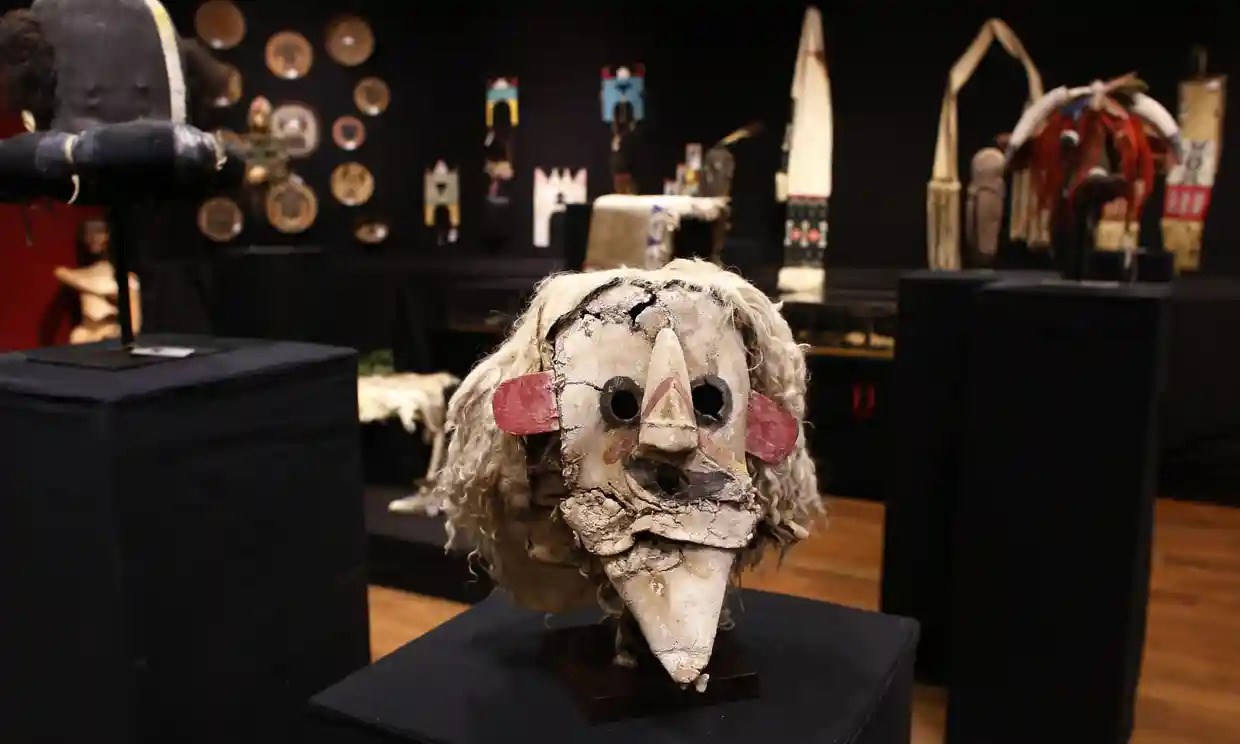'Delayed repatriation is delayed justice for Native peoples': Senators
13 bipartisan Senators urge five US institutions to comply with the Native American Graves and Repatriation Act of 1990.
-

A Puebloan Kachina Huhuwa mask displayed for sale among other Native American artifacts at a 2014 Paris auction, France (AFP)
Alaska's Republican Senators Lisa Murkowski and Dan Sullivan add their signatures to letters urging five museums and universities to repatriate Indigenous artifacts and the remains of those deceased to their descendants.
The letters collected the signatures of 13 bipartisan Senators calling on the University of California Berkeley, Harvard University, Illinois State Museum, Indiana University, and the Ohio History Connection to abide by the Native American Graves and Repatriation Act (NAGPRA) that was signed into US Federal Law in 1990.
The Act decrees that all institutions that benefit from Federal funding must repatriate all human remains, funerary objects, sacred objects, and objects of cultural patrimony to their descendants or original community.
The letters denounced the non-compliance of the institution as "delayed repatriation is delayed justice for Native peoples."
"For too long, Native ancestral remains and cultural items have been unconscionably denied their journey home by institutions, desecrated by scientific study, publicly displayed as specimens, left to collect dust on a shelf, or simply thrown in a box and forgotten in a museum storeroom," they read.
An investigation by ProPublica and NBC News showed that institutions all over the US are hoarding more than 110,000 looted Native American remains.
Senators question institutions' ethics
Murkowski said the letters aim to "elevate the issue" and educate the public on NAGPRA. She also revealed that she signed the letters "because it doesn't make any difference if you are a significant museum or university. If you have ancestral remains that have been part of a 'collection', they are ancestral remains that need to be returned and not necessarily kept as someone's private collection."
Senator Sullivan said the letters were sent to pressure the universities and museums into complying with the Act.
"Can you imagine somebody going to your ancestor’s grave and taking their bones, digging up their bones, and then when you go back saying, 'I’d like my great-great-grandfather’s bones back,' and they’re not being cooperative?" Sullivan remarked on Tuesday.
When the Act was put into law, US lawmakers estimated the repatriation period at 5 years, but more than 30 years later "a daunting amount of work" is yet to be completed.
"Experts reportedly estimate that it could take as many as 70 more years before NAGPRA’s directive of expeditious repatriation is fulfilled," the letters stated. The organizers proclaim that "this is simply unacceptable."
The Ohio History Connection, which is responsible for the management of multiple sites in Ohio, as well as the Indiana University, Illinois State Museum, and UC Berkeley, stated that they are ready to complete the process of repatriation, while Harvard University has not yet responded to the letters.
Read more: US tribes ask Pope for records related to Indian boarding schools.

 3 Min Read
3 Min Read








